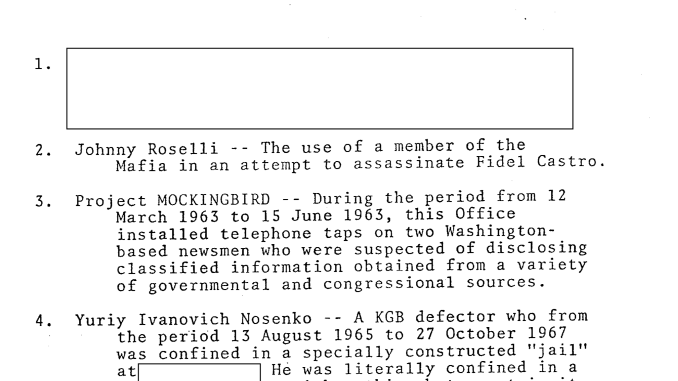
What is it, and how does it affect society? Operation Mockingbird was a program under the CIA in a joint effort with the media to recruit leading American journalists into a propaganda network of manipulating news media in order to control it for propaganda purposes. How much of it has ceased, or did it just infiltrate modern media and still is active today in the control over the streams of information to the public?
Operation Mockingbird was a program initiated in the 1950s under the CIA in a joint effort with the media to recruit leading American journalists into a propaganda network of manipulating news media in order to control it for propaganda purposes. The CIA funded student and cultural organizations under the International Organization of Journalists, used to groom and recruit journalists to cooperate in the network of propaganda. In which with the CIA agents as CEOs of media sources, would cooperate and control the streams of information to the public after a screening process and briefing of what is to be publicly made known.
In a 1977 Rolling Stone magazine article, “The CIA and the Media,” reporter Carl Bernstein wrote that by 1953, CIA Director Allen Dulles oversaw the media network, which had major influence over 25 newspapers and wire agencies.
Reporter Deborah Davis wrote a biography in 1979 on Katharine Graham, owner of The Washington Post, claiming that the CIA ran an “Operation Mockingbird”, and that the International Organization of Journalists was created as a Communist front organization and “received money from Moscow and controlled reporters on every major newspaper in Europe, disseminating stories that promoted the Communist cause.”
Davis claimed that Frank Wisner, director of the Office of Policy, had created Operation Mockingbird in response to the International Organization of Journalists, recruiting Phil Graham from The Washington Post to run the project within the industry. According to Davis, “By the early 1950s, Wisner ‘owned’ respected members of The New York Times, Newsweek, CBS and other communications vehicles.”
CIA support of front groups was exposed after a 1967 Ramparts magazine article reported that the National Student Association received funding from the CIA. In the 1970s, Congressional investigations and reports also revealed Agency connections with journalists and civic groups. None of these reports, however, mentions by name an Operation Mockingbird coordinating or supporting these activities.
However, a “Project Mockingbird” is mentioned in the CIA Family Jewels report, compiled in the mid-1970s. According to the declassified version of the report released in 2007, Project Mockingbird involved the wire-tapping of two American journalists for several months in the early 1960s.
Here is the report:
https://www.cia.gov/open/Family%20Jewels.pdf
Likely some reporters were unwittingly cooperating by indoctrinated influence and position in journalism schools in which candidates were recruited to further in the journalistic career by cooperating in the network. Media wire services were used to disseminate the news feed, with the bias of the propaganda pushing the agenda.
The most extensive discussion of CIA relations with news media from these investigations is in the Church Committee’s final report, published in April 1976. The report covered CIA ties with both foreign and domestic news media.
For foreign news media, the report concluded that:
The CIA currently maintains a network of several hundred foreign individuals around the world who provide intelligence for the CIA and at times attempt to influence opinion through the use of covert propaganda. These individuals provide the CIA with direct access to a large number of newspapers and periodicals, scores of press services and news agencies, radio and television stations, commercial book publishers, and other foreign media outlets.
For domestic media, the report states:
Approximately 50 of the [Agency] assets are individual American journalists or employees of U.S. media organizations. Of these, fewer than half are “accredited” by U.S. media organizations … The remaining individuals are non-accredited freelance contributors and media representatives abroad … More than a dozen United States news organizations and commercial publishing houses formerly provided cover for CIA agents abroad. A few of these organizations were unaware that they provided this cover.
CIA response:
The CIA stated that it had already been restricting use of the journalists by 1973.
In February 1976, Director George H. W. Bush announced that the CIA will not enter into any paid or contractual relationship with any full-time or part-time news correspondent accredited by any U.S. news service, newspaper, periodical, radio or television network or station.
By the time the Church Committee Report was completed, all CIA contacts with accredited journalists had been dropped. The Committee noted, however, that “accredited correspondent” meant the ban was limited to individuals “formally authorized by contract or issuance of press credentials to represent themselves as correspondents” and that non-contract workers who did not receive press credentials, such as stringers or freelancers, were not included.
Many have refused to believe the CIA were not still operating, and that this influence between the CIA and media were covered up.
Propaganda ban was lifted.
See article
https://foreignpolicy.com/2013/07/14/u-s-repeals-propaganda-ban-spreads-government-made-news-to-americans/
Some argue that the Smith-Mundt Act, adopted in 1948, explicitly forbids information and psychological operations aimed at the US public. However, Emma L. Briant points out that this is a common confusion – The Smith-Mundt Act only ever applied to the State Department, not the Department of Defense and military PSYOP, which are governed by Article 10 of the US Code.
Army Col. James A. Treadwell, who commanded the U.S. military psyops unit in Iraq in 2003, in The Washington Post stated, “There’s always going to be a certain amount of bleed-over with the global information environment.”
Former US Defense Secretary Donald Rumsfeld approved the document referred to, which is titled “Information Operations Roadmap.” The document acknowledges restrictions on targeting domestic audience, but fails to offer any way of limiting the effect PSYOP programs have on domestic audiences.
